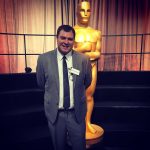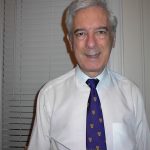Featured Alumni

Joe Albernaz
Assistant Professor of English and Comparative Literature, Columbia University
“I benefited so much from my years studying in and around Greenlaw Hall, encouraged by the incredible professors, the variety of unique programs for undergraduates (like the PIT Journal, or studying Shakespeare in London and Oxford), and the active literary scene around campus, especially in poetry. The experience was unforgettable, and not to mention the best possible preparation for the path I chose to follow of becoming an English professor.”

Andrew Carlberg
Producer of Oscar-winning short film, Skin (2018)
“I often say that my English degree has served me so much better than I could ever imagine in the entertainment industry, not just in terms of understanding story, but being able to communicate and process knowledge and how you decipher the world… I think one of the most valuable skills I have as a producer and what I try to do often is to be a spectacularly clear communicator. And I think that that’s what I was able to focus in on with my English degree and with those classes.”

Courtney Coppage
Assistant Editor at Technica Editorial
“Arriving at UNC, I thought ‘old’ and even American literature was boring, but it didn’t take long for me to realize that I was the one who made literature boring—that there was something new and exciting in all of my classes. Dr. Carlston was the first to teach me what reading means; the differences between summary, description, evaluation, and analysis; and how to express myself well.”

Allison Cummings, MD
Physician in Family Medicine
“While basic science courses are important, on a day-to-day basis, I was far more prepared for the art of medicine by my non-science courses. In particular, English, Creative Writing, and Comparative Literature courses helped me learn how to think critically about concepts like illness, disability and mortality– a daily affair in medicine.”

Arthur J. DeBaugh
Attorney at Bell, Davis & Pitt
“The English professors with whom I studied taught me how to write, how to analyze a text, and how to think critically and arrange thoughts logically for my readers—skills which have been invaluable to me as an attorney. My English major prepared me for law school better than any discipline that I can imagine.”

Andrew Edmonson
Membership Manager, Museum of Fine Arts, Houston, Texas
“My passion for the last twenty-five years has been to fight for the civil rights of LGBT Americans as an LGBT activist. In this role, I have written op eds for media outlets, managed media relations for direct action social justice organizations, and served as spokesperson for LGBT causes. All of my activism is based on what I learned as an English major: how to make a compelling case, anticipate objections, and craft compelling rebuttals.”

David Gardner
Founder of The Motley Fool, a multimedia financial-services company
The English Department at Carolina ” led me toward a love of literature, the liberal arts, unconventional wisdom, humor, a certain sophomore in my creative writing class who’s my wife now of 27 years.”

Vikram O. Kadiri
Corporate and M&A Attorney
“The most significant part of my college experience was the opportunity to direct and produce a 50-min narrative film…the English & Comparative Literature department was the only place that gave me the freedom to pursue a Senior Honors Thesis in the form of a feature film…Although this experience gave me the opportunity to pursue a career in filmmaking, I chose instead to pursue a legal career, where my background and skill set have proven to be not only unique but crucial…In the legal field, the difference between a lawyer who merely makes his case and a lawyer who can craft a story for the jury is remarkable. In my experience, the jury has always sided with the latter.”

Alane Salierno Mason
Vice President & Senior Editor at W.W. Norton & Company
“Our whole society needs more people who can see things from many points of view, who can inhabit someone else’s world in the ways that only literature—especially foreign literature—enables us to do.”

Michael McTague
Executive Vice President, Able Global Partners and Contributing Editor, Equities.com
“English majors develop skill in writing and speaking – two critical skills for effective management. After completing a Master’s in English literature at UNC, I went on to various management positions. The skills of effective writing, analysis and critical thinking are absolutely essential when helping organizations raise funds or set a clear strategy.”

Jules Norwood
East Carolina University News Service
“My English degree…equipped me well for a winding career path that has included news reporting, freelance magazine writing, and a stint with the family business that involved, among many other things, writing brokerage listings and social media posts…Long story short, the critical thinking and editing skills I learned in my English classes at UNC have prepared me to handle every challenge I have faced in my career.

Joanna Pearson
Psychiatrist, Poet, YA Author
“Whereas in many of my other classes, I learned facts or theories or mechanisms of action, in my English classes, I learned how to think analytically and articulate my ideas. I also thought a lot about character—what people want, what motivates them, why they do what they do, their backstory—and language as a tool, both of which have turned out to be awfully relevant now to me as a psychiatrist.”

Miguel Penabella
PhD Student at UC Santa Barbara
“The combination of insightful film courses and encouraging faculty provided me with the experience and support network to further my academic career at the graduate level. My work at UNC also prepared me to become a published essayist on films and video games.”

